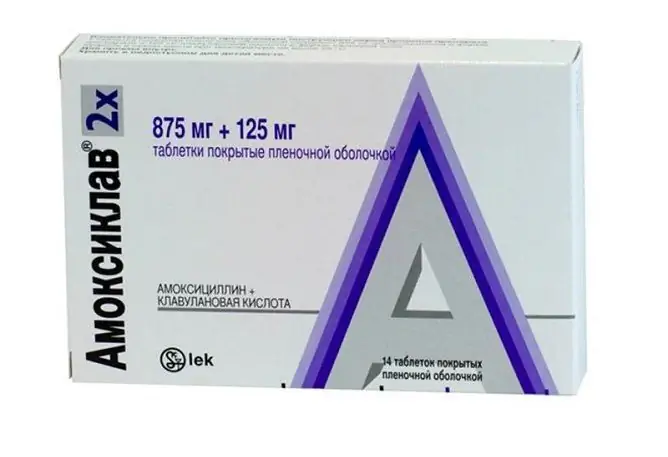- Author Rachel Wainwright wainwright@abchealthonline.com.
- Public 2023-12-15 07:39.
- Last modified 2025-11-02 20:14.
Cimetidine
Instructions for use:
- 1. Pharmacological action
- 2. Pharmacokinetics
- 3. Dosage
- 4. Interaction with other drugs
- 5. Pregnancy and lactation
- 6. Side effects
- 7. Indications for use
- 8. Contraindications
- 9. Special instructions
Pharmacological action of Cimetidine

Cimetidine is a histamine H2 receptor blocker. Suppresses the production of hydrochloric acid stimulated by food, gastrin, histamine and acetylcholine. By lowering the hydrochloric acid level, it increases the pH level and decreases the activity of pepsin.
Cimetidine triggers the protective mechanism of the gastric mucosa, heals the damage caused by the action of hydrochloric acid. Reduces the concentration of cytochrome P450. It does not affect adrenergic receptors, does not have an anesthetic effect. After taking Cimetidine inside, the therapeutic effect occurs after 1 hour and continues to act for 4-5 hours.
Pharmacokinetics
Cimetidine is completely absorbed from the gastrointestinal tract. Metabolism occurs on "first pass". The bioavailability of the drug is 60-70%. The maximum concentration in blood plasma, when taken on an empty stomach, is reached after 1 hour, after 3 hours a second peak may be observed. Cimetidine is distributed in body tissues. The level of binding to plasma proteins is 20%.
The half-life of cimetidine is approximately 2 hours; with renal dysfunction, it may increase. It is excreted mainly unchanged in the urine. The clearance of cimetidine is increased in patients with burns.
Dosage of Cimetidine
The instructions for cimetidine recommend setting the dosage based on the general condition of the patient. For adult patients, a single dose is 100-800 mg.
With intravenous administration of Cimetidine, a single dose is 200 mg, with intravenous infusion - 400 mg. The maximum permissible daily dose, regardless of the method of administration, should not exceed 2 g.
The maximum allowable dose of Cimetidine for children 1 year of age and older, regardless of the route of administration, is 25-30 mg / kg / day in divided doses. Children under one year old - 20 mg / kg / day.
Interaction of cimetidine with other drugs
Simultaneous administration with antacids containing aluminum hydroxide and magnesium hydroxide may lead to a decrease in the absorption of cimetidine. When combined with sulfonylurea derivatives - hypoglycemic agents - hypoglycemia is sometimes observed.
The combination of cimetidine with chlordiazepoxide, clorazepate, triazolam, alprazolam, diazepam, clobazam, nitrazepam, flurazepam leads to an increase in the concentration of benzodiazepines in the blood plasma. May enhance sedation.
Simultaneous use increases the concentration of amiodarone in the blood, due to a slowdown in its metabolism.
The combination of cimetidine with atenolol in some cases causes severe bradycardia.
When taken simultaneously with benzylpenicillin, it increases its bioavailability.
Simultaneous reception with vecuronium chloride, verapamil, gallopamil enhances the effect of these drugs.
The combination with indomethacin leads to a decrease in its concentration in blood plasma, without affecting its anti-inflammatory effect.
The combination with ketoconazole and itraconazole reduces their absorption in the gastrointestinal tract.
Cimetidine reduces the clearance of lidocaine and increases its concentration in the blood plasma, which can lead to an increase in the side effects of lidocaine.
Pregnancy and lactation

Due to the fact that Cimetidine can penetrate the placental barrier and be excreted in breast milk, the drug should be used with caution during pregnancy and breastfeeding.
Side effects of Cimetidine
- with a sharp cancellation of cimetidine, relapses of peptic ulcer are possible;
- vomiting, pancreatitis, flatulence, hepatitis, nausea, diarrhea, jaundice;
- drowsiness, depression, increased fatigue, dizziness, emotional lability, hallucinations, agitation, anxiety, nervousness, psychosis, headache, hyperthermia, confusion, decreased libido;
- itching, skin rash, hyperemia, exfoliative dermatitis, erythema multiforme, angioedema, Stevens-Johnson syndrome;
- possible in men (especially at high doses): decreased potency, gynecomastia;
- rarely - thrombocytopenia, leukopenia, pancytopenia, neutropenia, agranulocytosis, aplastic and hemolytic anemia, eosinophilia;
- bradycardia, AV block, tachycardia, lowering blood pressure, vasculitis;
- interstitial nephritis, urinary retention;
- arthralgia, myalgia, polymyositis;
- hair loss.
Indications for the use of Cimetidine
- symptomatic ulcers;
- systemic mastocytosis;
- peptic ulcer in the acute phase;
- polyendocrine adenomatosis;
- prevention of exacerbations of peptic ulcer disease;
- heartburn (caused by hyperchlorhydria);
- reflux esophagitis.
According to the instructions, Cimetidine can be used as an adjunct therapy for deficiency of pancreatic enzymes, rheumatoid arthritis, urticaria (in acute form).
Contraindications
Hypersensitivity to cimetidine.
special instructions
Cimetidine should be used with caution in patients with chronic heart failure, diseases of the hematopoietic organs, cirrhosis of the liver, renal or hepatic insufficiency, suppression of immunity, children and adolescents under 16 years of age.
Before starting the course, you should make sure that the patient does not have malignant diseases of the digestive system.
Patients with renal or hepatic dysfunction require a specially adjusted dosing regimen.
With prolonged use, it is necessary to carry out systematic monitoring of the state of the liver and blood. The instructions for cimetidine are not recommended to abruptly stop taking the drug due to the risk of recurrence of peptic ulcer disease.
Information about the drug is generalized, provided for informational purposes only and does not replace the official instructions. Self-medication is hazardous to health!






